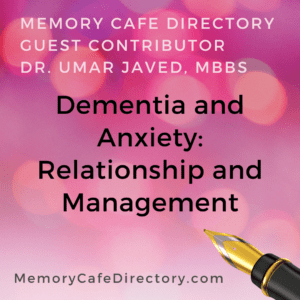Memory Cafe Directory posts and/or links to retailers can be advertising, sponsored, or affiliate links. We may earn a small commission from them. Thank you.
Understanding the relationship between and the effective management of dementia and anxiety.
Dementia is a progressive brain condition that impairs a person’s memory, reasoning, and behavior. Anxiety is just one of the symptoms that can result from this complicated illness.
Millions of people worldwide suffer from anxiety, and persons with dementia are more likely than the general population to experience it. Moreover, a coexisting anxiety disorder can worsen dementia symptoms, making them harder to manage and lowering the patients’ and carers’ quality of life.
It is vital to understand the connection between dementia and anxiety, their symptoms, the root causes that make people living with dementia feel anxious, available treatment options, and other ways to support a person with dementia who also experiences anxiety.
A Brief Overview of Anxiety
Anxiety is a feeling that is accompanied by persistent excessive worry, restlessness, and bodily changes like muscle tension and elevated blood pressure. It occurs when a person is exposed to a stressor or even thinking about it. Physical signs like sweating, shaking, disorientation, or a rapid heartbeat may also represent a panic disorder—another type of anxiety disorder.
People with anxiety disorder experience recurrent intrusive thoughts or worries more often than they would without a condition. In addition, these worries significantly interfere with their daily life. Out of fear, they would avoid particular circumstances, including ordinary ones, such as social interactions, domestic chores like paying bills and preparing meals, and others.
Types of Anxiety Disorders
There are several types of anxiety disorders, including the following:
Generalized Anxiety Disorder (GAD)
It is characterized by excessive and persistent worry and anxiety in everyday situations or activities, even when there is no clear reason to worry.
Panic Disorder
The disorder is characterized by unexpected and recurrent panic attacks — sudden and intense episodes of fear or discomfort that can last for several minutes. Individuals with panic disorder may also experience physical symptoms such as sweating, trembling, shortness of breath, heart palpitations, and chest pain.
Agoraphobia
This form of phobia is characterized by fear or avoidance of situations or places where escape may be difficult. It also involves the fear or embarrassment and unwillingness to visit places where help may not be available if a panic attack or other emergency occurs. This could include crowded places or public transportation.
Social Anxiety Disorder (SAD)
It is characterized by an intense fear of social situations and a fear of being judged or evaluated by others. Individuals with SAD may avoid social situations or endure them with anxiety attacks or extreme distress. This can include speaking in public, eating in front of others, or participating in group activities.
Specific Phobias
It is characterized by an intense and persistent fear of specific objects, situations, or activities, such as heights, spiders, or flying. The fear is excessive and unreasonable, and individuals with specific phobias may go to great lengths to avoid the feared object or situation.
Separation Anxiety Disorder
This is characterized by excessive and developmentally inappropriate anxiety related to separation from attachment figures or from home. This can include excessive worry about losing the attachment figure or being separated from them, reluctance or refusal to go to school or to sleep away from home, and physical symptoms such as headaches or stomach aches.
Selective Mutism
It is characterized by a consistent failure to speak in certain situations. Individuals are perfectly able to communicate in other circumstances but remain muted in specific social interactions.
Symptoms of Anxiety in Dementia Patients
Anxiety is a prevalent symptom of dementia that can significantly lower a person’s quality of life. Between 38 and 72% of patients with dementia have been observed to experience anxiety. Patients with dementia may exhibit the following anxiety symptoms:
Restlessness
Patients with anxiety-related dementia may experience restlessness and have trouble remaining motionless.
Agitation
They may easily become anxious, upset, or frustrated.
Sleep Disturbances
Insomnia or other sleeping issues may occur because of anxiety. This can also worsen the symptoms of dementia like disorientation and agitation.
Changes in Appetite
Patients with dementia may eat less or lose interest in eating due to anxiety.
Physical Symptoms
Physical signs of anxiety include sweating, shaking, and an accelerated heartbeat.
Compulsive Behaviors
Some dementia patients who experience anxiety may exhibit compulsive behaviors, such as repeatedly checking if windows or doors are closed.
Increased Reliance
Dementia patients who experience anxiety may have a decreased number of tasks they can do by themselves and require more assurance and support from their carers.
Common Causes of Anxiety in Dementia Patients
Cognitive decline
Dementia is a degenerative neurological disorder that impairs cognitive skills like language, reasoning, and memory. People with dementia may experience growing anxiety as these skills deteriorate because they find it difficult to understand their surroundings and express their needs in a usual way.
Changes in the Environment
When dementia sufferers are placed in strange or noisy situations, they may experience anxiety. They may also feel uneasy when routines or daily schedules change.
Physical discomfort
Dementia patients may be unable to communicate their physical pain, which can cause anxiety. For instance, they might experience pain or distress but cannot express it to their family or carers.
Medicines
A few drugs used to treat dementia and other illnesses might have undesirable side effects like agitation and anxiety.
Loss of Independence
As dementia worsens, sufferers may become less able to take care of basic needs like clothing, washing, and eating themselves. This decline in independence might cause a lot of anxiety, as well as other mental issues, such as apathy and depression.
Carers’ Stress
Family members or paid carers frequently care for people with dementia. Stress and burnout among these carers may have a negative effect on the level of care they offer, which may result in heightened anxiety in dementia patients.
It’s essential to remember that anxiety is frequently triggered by a combination of these causes rather than just one. Seeking professional assistance from a therapist or mental health professional is critical in understanding the underlying issues and devising an effective treatment strategy.
Treatment Options for Anxiety
Patients with dementia frequently experience anxiety, which can significantly lower their quality of life. Depending on the severity of the problem, the patient’s medical history, and other circumstances, the doctor may choose different options for treating anxiety in dementia patients.
The following are some of the most common treatment options for treating anxiety in Alzheimer’s or dementia:
Medications
Patients with dementia may benefit from taking anxiety medication such as benzodiazepines, tricyclic antidepressants, and selective serotonin reuptake inhibitors (SSRIs). However, due to the possibility of negative effects and drug interactions, these medications should only be administered under the supervision of a healthcare practitioner.
Psychotherapy
Patients with dementia may benefit from therapies, such as cognitive-behavioral therapy (CBT) and mindfulness-based stress reduction (MBSR), to control their anxiety. This form of anxiety treatment is intended to assist patients in accepting their condition, recognizing and altering thought patterns that might be causing their anxiety, and learning helpful coping techniques.
It’s important to remember that the best course of treatment for anxiety in dementia patients should be determined by a healthcare professional and adapted to the specific patient’s needs.
Self-help Tips For Anxiety
Unless your anxiety is chronic, it can be managed by practicing lifestyle modifications. Here are some self-help tips for managing anxiety:
Perform Relaxation Techniques
Progressive muscle relaxation (PMR), deep breathing, meditation, and yoga are all effective relaxation techniques that can aid in reducing anxiety.
Exercise Regularly
Exercise is an excellent way to manage anxiety. It helps to reduce stress, improves mood, and promotes better sleep.
Get Adequate Sleep
Sleep is important for overall health and well-being. Try to get 7-9 hours of sleep daily.
Eat a Healthy Diet
Eating a healthy diet can help reduce anxiety. Avoid foods high in sugar, caffeine, and alcohol, which can exacerbate anxiety symptoms.
Challenge Negative Thoughts
Anxiety frequently involves negative thought processes. Examine your thoughts to see if they are founded on facts or assumptions.
Practice Mindfulness
Mindfulness is being present in the moment. This can help reduce anxiety by bringing your attention to the present moment and away from worries about the future or regrets about the past.
Seek Support
Talking to a friend or family member can be helpful in managing anxiety. You may also consider seeing a therapist or counselor for additional support.
Remember that managing anxiety takes time and effort. Be patient with yourself and keep trying different strategies until you find what works best for you.
Supporting People With Dementia to Reduce Their Anxiety
While helping someone experiencing anxiety due to dementia, it is vital to understand the specifics of both conditions and how to treat them and evaluate the patient’s attitude and symptoms. Confusion and memory loss are the two most prevalent signs of dementia that can be upsetting and irritating for the person experiencing them.
Spend some time acknowledging and validating the sentiments of dementia patients as you listen to their worries. A soothing and reassuring tone of voice will help create a quiet and encouraging environment. To make them feel less anxious and more at ease, keep in mind that your presence and support can be helpful.
About the Author
Dr. Umar Javed, MBBS
Dr. Javed is a licensed physician who specializes in mental healthcare. He helps create the most up-to-date, science-backed, and detailed patient information for online mental health clinic MEDvidi, using his expertise and research skills.
His particular area of interest and research includes the most common mental health problems facing adults, including ADHD, anxiety, depression, insomnia, and others.
Become a Contributor!
 Do you want to be a Memory Cafe Directory contributor? If you have helpful information to share with our community, read about the guidelines, then get in touch to discuss what you have to offer.
Do you want to be a Memory Cafe Directory contributor? If you have helpful information to share with our community, read about the guidelines, then get in touch to discuss what you have to offer.
Thank you.




